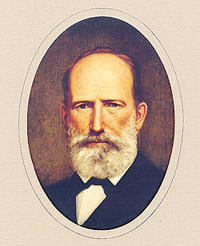Edward Clark, Governor of Texas by Chance. (original) (raw)
East Texas has produced two remarkable men named Ed Clark. Today�s subject is Edward Clark of New Orleans, Alabama�and Marshall, Texas.
Edward Clark was born in New Orleans, Louisiana, in 1815. Following the death of Clark�s father, he and his mother moved to Montgomery, Alabama, where he was educated for a legal career. Clark moved to Marshall, Texas, in 1841, and opened a legal practice. He married there, established a home, and began a thriving practice in the Texas Republic.
 |
Govenor Edward Clark Wikimedia Commons |
|---|
Clark served as a delegate to the Texas constitutional convention in 1845, then terms in the House of Representatives and the Senate of the state legislature. He was on the staff of Governor James Pinckney Henderson during the Mexican-American War, and received appointment as secretary of state for Texas by Governor Elijah M. Pease. Clark was elected lieutenant governor in 1859, when Sam Houston was elected governor.
Houston and Clark assumed office just in time to deal with the secession issue. Houston�s whole political career in Texas had worked toward securing statehood for Texas and keeping it in the Union. Clark�s sympathies were more "southern," but Houston decided policy as long as he was governor. That ended in February 1861.
Of all the Deep South governors, only Houston refused to call a secession convention after South Carolina began the process on December 20, 1860. When he refused to do so, secessionists went around him to persuade county judges to call elections for delegates to such a convention.
Houston then called the legislature into special session but it did no good since most of the legislators also had been elected as delegates to the convention. They met on January 28, 1861, and quickly passed an ordinance of secession.
Convention members remembered that all office holders had taken an oath to support the Texas and US Constitutions, so they decided they must be sworn in again, this time pledging allegiance to the new and separate governments of Texas and the Confederacy.
When Houston refused to do so, the convention declared the office of governor vacated, and that elevated Clark to the post. He took the required oath of office and went right to work raising troops and money and generally readying Texas for war. Clark wanted to make his temporary governorship a permanent one, but lost the first Confederate election for the office to Francis R. Lubbock. Clark served in the Confederate army, then practiced law in Marshall until his death in 1880.
�
Archie P. McDonald, PhD
All Things Historical October 5, 2004 column
A syndicated column in over 40 East Texas newspapers
Distributed by the East Texas Historical Association. Dr. Archie McDonald is the Association's executive director and author of more than 30 books on Texas history.
Books by Archie P. McDonald - Order Here